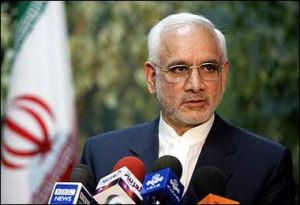Tehran, YJC. Former Head of Atomic Energy Organization has said that the Leader has often considered moves by the West in resolving the nuclear issue while other figures have disagreed.

The former Head of the Iranian Atomic Energy Organization said in
an interview with ISNA "Whenever the West would show significant signs, the Leader
would get involved in the issue and try to resolve the problem. It would be
unfair to say that he did not want the issue resolved.”
Qolamreza Aqazadeh added "In 2008 there were signs from the West
to resolve the issue. The Leader launched a meeting which I also attended. I stated
there that with the new approach adopted by the West the issue could be
pursued. The Leader decided that the West’s approach be considered and demanded
us to pursue the matter, but there were some who contravened.”
He pointed back to the time when decisions were made to consider
nuclear supplements for the country’s electricity grid and said "In an extended
report I had delivered to the Supreme Leader I had emphasized the fact that the
country’s electricity problems would not have been resolved unless we
introduced the new technology. At that time we had noticed that developed
countries had invested hugely in small and household power plants with more than
90 percent efficiency to provide heat, cold, and electricity. Along with
Messrs. Fayyazbakhsh and Saidi, we entered these fields which have grown so
much in the country right now, and more than 10,000 MW demand for such power
plants is made throughout the country right now. There was much success in this
field. We started a big project in Golgohar so that we would be able to use
these small power plants. The projects were followed in Bandarabbas as well.”
Aqazadeh also believed that the nuclear issue will be an
important one for the Rouhani administration and said "I believe that the
nuclear issue is in its 90th minute. Really, both the West and Iran must
start serious talks.”
"In the 90th minute the one with more stamina will
win. We must not pressure Rouhani to seal the deal in no time,” he believed.
"I believe that there was no need for the events that followed
2008,” he asserted, not willing to provide details on the 2008 plan and the preceding
Western initiatives "the President did not agree with the plan, and that was
where my disagreements with Ahmadinejad came in. Mr. Ahmadinejad had his own
evaluations and thought that we must not use that approach.”
The
former Head of Iran’s Atomic Energy Organization pointed to the 5+1 negotiations
and stated "The principal thing between us is building trust. The Rouhani team
must set for real, practical negotiations.”
He added "The fact that the West
says that the outcome of the talks and the formation of some cooperation could
amount to the recognition of Iran’s right to enrichment is something
unprecedented. It is a positive approach and must be considered.”



